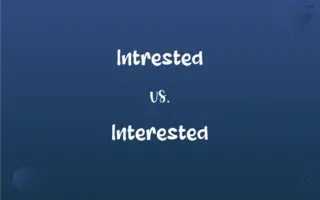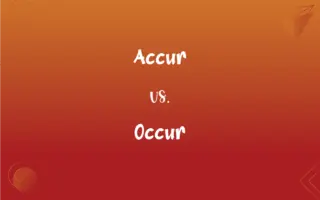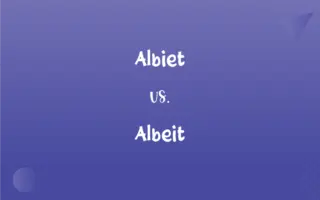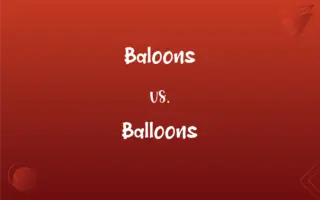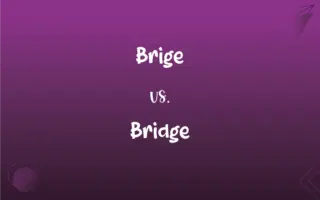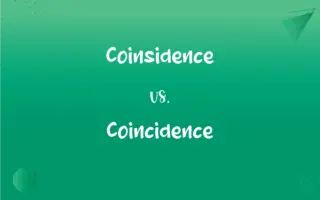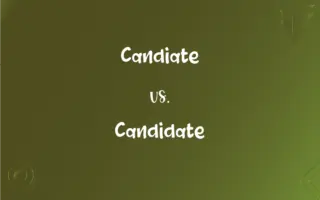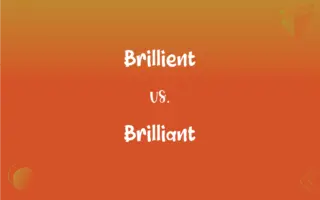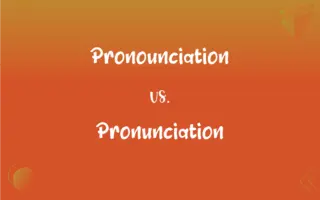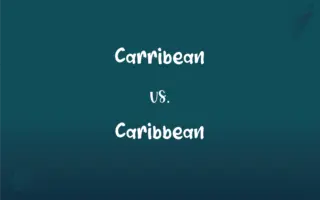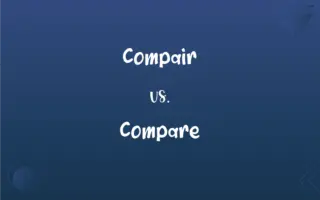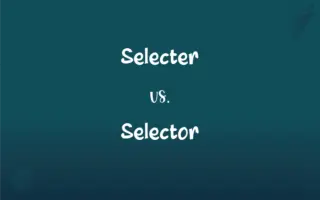Studing vs. Studying: Mastering the Correct Spelling
Edited by Janet White || By Aimie Carlson || Updated on March 8, 2024
"Studing" is incorrect spelling, whereas "studying" is correct spelling. Studying refers to the act of devoting time and attention to gaining knowledge on a subject.
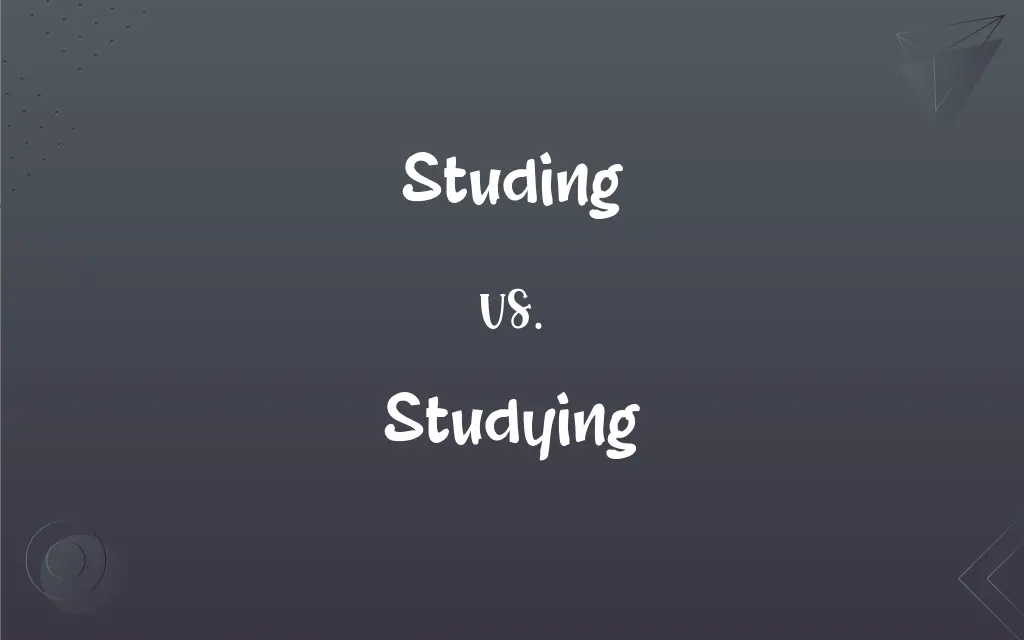
Which is correct: Studing or Studying
How to spell Studying?

Studing is Incorrect

Studying is Correct
ADVERTISEMENT
Key Differences
Associate "Studying" with "buddy," as study buddies often study together, both containing a double consonant.
Recall "Studying" rhymes with "modifying," both ending in 'ying.'
Note "Studying" is like "cuddling," where doubling the consonant before adding 'ing' is common.
Think of "Studying" as "student trying," focusing on the 'dy' in both.
Remember "Studying" has a double 'd' as in "adding" knowledge.
ADVERTISEMENT
Correct usage of Studying
I prefer studing in a quiet room without distractions.
I prefer studying in a quiet room without distractions.
We formed a group for studing math together.
We formed a group for studying math together.
She found studing at the library to be very effective.
She found studying at the library to be very effective.
Their success is attributed to hard studing and determination.
Their success is attributed to hard studying and determination.
He spends a lot of time studing for his exams.
He spends a lot of time studying for his exams.
Studying Definitions
To analyze or examine in detail.
She was studying the art piece closely.
Applying oneself to understand a subject.
Studying mathematics can be challenging.
To observe or scrutinize something carefully.
The detective was studying the clues at the crime scene.
To undertake a course of study in a particular field.
He is studying engineering at the university.
The act of learning or acquiring knowledge on a subject.
He spent the evening studying for his exams.
The effort to acquire knowledge, as by reading, observation, or research
The study of language has overturned many misconceptions.
An act or effort made in the pursuit of knowledge
Applied himself to his studies.
A branch of knowledge or department of learning
The study of geography.
Graduate studies.
Attentive examination or analysis
The new drug is still under study.
A detailed examination, analysis, or experiment investigating a subject or phenomenon
Conducted a study of children's reading habits.
A document or publication presenting the results of such an endeavor.
A literary work treating a particular subject or character
The novel is a study of Irish childhood.
A preliminary sketch, as for a work of art or literature.
(Medicine) A diagnostic test.
(Music) A composition intended as a technical exercise.
A state of mental absorption
She is in a deep study.
A room intended or equipped for studying or writing.
A noteworthy or interesting example
He is a study in contradictions.
To apply one's mind purposefully to the acquisition of knowledge or understanding of (a subject).
To take (a course) at a school.
To try to memorize
Studied the lines for her role in the play.
To perform a study of; investigate
We need to study the problem further.
To read or look at carefully
Studied the map.
Studied his expression.
To give careful thought to; contemplate
Let's study our next move.
(Medicine) To perform a diagnostic test on (a part of the body, for example).
To apply oneself to learning, especially by reading
Studied for the exam.
To pursue a course of study
Studied at Yale.
To ponder; reflect.
The action of the verb to study.
Present participle of study
Reading carefully with intent to remember
Studying Sentences
Studying in groups can be beneficial for subjects like history and science.
Studying regularly can significantly improve your grades.
Creating a study schedule helps in organizing studying time efficiently.
Some people find that studying with music helps them concentrate better.
Taking breaks during studying sessions can help maintain focus and prevent burnout.
Flashcards are a great tool for studying languages and vocabulary.
Studying abroad offers an opportunity to learn a new language and culture.
Engaging in active studying methods, such as teaching the material to someone else, enhances understanding.
The habit of studying daily keeps the material fresh in your mind.
Using highlighters can make studying more effective by marking important information.
Studying in a well-lit, comfortable space can increase productivity.
Discussing topics with classmates is an interactive way of studying.
Creating mind maps is a creative and effective method of studying complex subjects.
Setting specific goals for each studying session can make it more effective.
Using online resources and apps can enhance the studying experience.
Writing summaries of chapters is a useful studying technique for retaining information.
Studying can be more enjoyable when you reward yourself for reaching goals.
Explaining your notes out loud is a great way of studying and reinforcing learning.
Revising the material regularly is a key part of studying for any subject.
Studying with a partner can provide motivation and support.
Organizing study materials and notes is crucial for effective studying.
Studying early in the morning can be very productive for some people.
Studying consistently, rather than cramming, leads to better long-term retention of information.
Studying before bedtime can help some people remember information better.
Using past exam papers as a studying tool can help prepare for the types of questions asked.
FAQs
What is the pronunciation of studying?
Studying is pronounced as /ˈstʌd.i.ɪŋ/.
What is the root word of studying?
The root word is "study."
Which vowel is used before studying?
Typically, "a" is used, as in "a studying session."
What is the plural form of studying?
Studying remains the same in plural form.
Which conjunction is used with studying?
Conjunctions such as "and," "but," and "while" are used.
What is the singular form of studying?
Studying is both singular and plural; its form doesn't change.
Is studying a noun or adjective?
Studying is primarily a form of the verb (gerund) and can function as a noun.
Which article is used with studying?
Both "a" and "the" can be used.
Is studying an adverb?
No, studying is not an adverb.
Why is it called studying?
"Studying" comes from the act of applying one's mind to learning or understanding a subject.
What is the verb form of studying?
The verb form is "study."
Is studying a vowel or consonant?
Studying starts with a consonant.
Is studying a negative or positive word?
It's neutral; context determines its connotation.
Is the studying term a metaphor?
It can be used metaphorically in some contexts.
Is the word studying imperative?
No, studying is not imperative; it's descriptive.
What is the opposite of studying?
The opposite could be "ignoring" or "neglecting."
Which determiner is used with studying?
Determiners like "the," "a," or "this" can be used.
What is the second form of studying?
The second form is "studied."
Which preposition is used with studying?
Prepositions like "for," "about," and "on" are used.
What is a stressed syllable in studying?
The first syllable, "stud," is stressed.
What part of speech is studying?
Studying is a gerund (verb form used as a noun).
What is another term for studying?
Another term for studying is "learning" or "researching."
What is the first form of studying?
The first form is "study."
Is studying an abstract noun?
Yes, as a noun, it is abstract, referring to an action.
Is studying a countable noun?
As a gerund, it's not typically counted.
How do we divide studying into syllables?
Studying is divided as stud-y-ing.
What is the third form of studying?
The third form is also "studied."
Is studying a collective noun?
No, it's not a collective noun.
How many syllables are in studying?
There are three syllables in "studying."
How is studying used in a sentence?
Example: "She was studying biology for her upcoming test."
About Author
Written by
Aimie CarlsonAimie Carlson, holding a master's degree in English literature, is a fervent English language enthusiast. She lends her writing talents to Difference Wiki, a prominent website that specializes in comparisons, offering readers insightful analyses that both captivate and inform.
Edited by
Janet WhiteJanet White has been an esteemed writer and blogger for Difference Wiki. Holding a Master's degree in Science and Medical Journalism from the prestigious Boston University, she has consistently demonstrated her expertise and passion for her field. When she's not immersed in her work, Janet relishes her time exercising, delving into a good book, and cherishing moments with friends and family.
